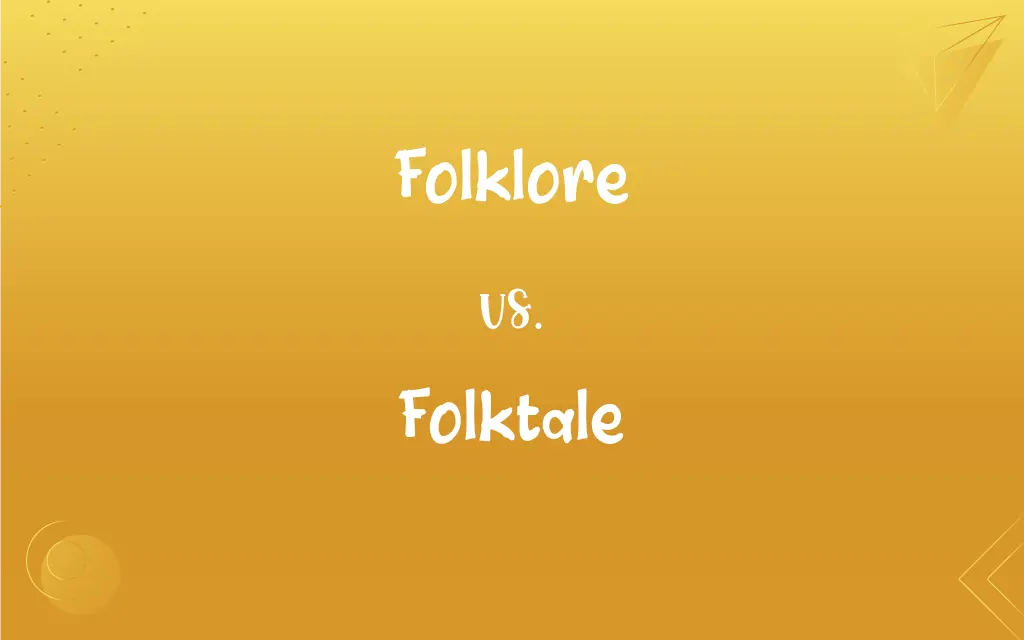Folklore vs. Folktale: What's the Difference?
Edited by Aimie Carlson || By Janet White || Published on November 15, 2024
Folklore encompasses the totality of traditional beliefs, customs, and stories of a community, while a folktale is a specific story from folklore, often involving mythical creatures or heroic deeds.

Key Differences
Folklore represents the collective wisdom, traditions, and cultural heritage of a community, passed down through generations, often orally. It includes myths, legends, rituals, music, and indeed, folktales, which are a subset of this vast cultural repository. Folktales, on the other hand, are specific narratives within folklore that embody the moral, ethical, and cultural values of the community, often through allegorical and fantastical storytelling.
Folklore serves as a cultural backbone, providing a sense of identity and continuity for a community. It encompasses not just stories but also encompasses dances, songs, proverbs, and even traditional customs and practices. Folktales, as a component of folklore, act as vehicles for these cultural values, often told and retold in various forms, evolving with each telling but retaining core lessons and themes.
Folklore can be seen as a broad tapestry of a community's cultural expressions, folktales are the individual threads that weave together to form the larger picture. They are the stories that are told for entertainment, education, and moral instruction, reflecting the hopes, fears, and values of the community. Folklore, however, includes not just these stories but also the rituals, ceremonies, and traditional ways of life that define a community's cultural identity.
Folklore is dynamic, changing with the community as it adapts to new circumstances and integrates new experiences. It's a living cultural archive that includes everything from traditional remedies and crafts to supernatural tales and historical legends. Folktales, while also dynamic, are more narrowly focused on storytelling, providing a narrative form for the expression of folklore's themes and values.
Folktales are an essential element of folklore, they represent only one facet of the broader cultural practices and traditions that define a community's heritage. Folklore encompasses a wide range of cultural expressions, with folktales serving as one of the most engaging and enduring aspects, connecting generations through shared stories.
ADVERTISEMENT
Comparison Chart
Definition
The collective traditions, beliefs, and customs of a community.
A narrative story that is part of folklore and often mythical.
Components
Includes tales, music, dances, rituals, and proverbs.
Primarily narrative stories with plots, characters, and settings.
Function
Preserves cultural identity, moral values, and historical lessons.
Entertains and educates with moral and ethical lessons.
Transmission
Passed down orally, through practice, or by example.
Traditionally told orally in an informal setting.
Variety
Encompasses a broad spectrum of cultural expressions.
Focuses on specific stories within the broader context of folklore.
ADVERTISEMENT
Folklore and Folktale Definitions
Folklore
Encompasses both material and immaterial cultural elements.
The crafting of Navajo blankets is a significant aspect of their folklore.
Folktale
A traditional narrative story passed down orally.
Cinderella is a folktale known in many cultures with variations.
Folklore
Acts as a cultural repository for a community.
Irish folklore is rich with tales of leprechauns and faeries.
Folktale
Reflects the cultural context from which it originates.
The Japanese folktale Momotaro reflects themes of bravery and camaraderie.
Folklore
The comprehensive body of traditions in a culture.
The dragon dance is an important part of Chinese folklore during Lunar New Year celebrations.
Folktale
Adaptable, with variations across different cultures.
The story of La Llorona is a folktale with many versions throughout Latin America.
Folklore
Transmitted across generations through various mediums.
Folk songs are a vibrant expression of Appalachian folklore.
Folktale
Often features mythical creatures or heroic deeds.
The Russian folktale of Baba Yaga involves a witch living in a house on chicken legs.
Folklore
Reflects the values, beliefs, and practices of a people.
The tradition of storytelling under the baobab tree is central to African folklore.
Folktale
Serves to convey moral and ethical lessons.
The folktale The Tortoise and the Hare teaches the value of perseverance.
Folklore
The traditional beliefs, myths, tales, and practices of a people, transmitted orally.
Folktale
A story or legend forming part of an oral tradition.
Folklore
The comparative study of folk knowledge and culture. Also called folkloristics.
Folktale
A tale or story that is part of the oral tradition of a people or a place.
Folktale
A tale circulated by word of mouth among the common folk, especially one forming part of the tradition of a culture.
Folktale
A tale circulated by word of mouth among the common folk
FAQs
What is folklore?
Folklore is the collection of traditional beliefs, customs, stories, and cultural practices of a community.
Are all folk stories considered folktales?
Most folk stories can be considered folktales if they convey narratives with cultural or moral significance.
How does folklore differ from folktale?
Folklore is the broader cultural tapestry, while folktale refers specifically to narrative stories within that tapestry.
What defines a folktale?
A folktale is a story from folklore, typically passed down orally, featuring mythical elements and moral lessons.
Can a folktale exist outside of folklore?
Folktales are inherently part of folklore, embodying the cultural and moral values of a community.
What role does folklore play in cultural identity?
Folklore serves as a foundation for cultural identity, preserving and transmitting the values and traditions of a community.
How are folktales transmitted?
Folktales are traditionally passed down orally from one generation to the next.
How do modern media affect folktales?
Modern media can help preserve and disseminate folktales, but it can also lead to changes in traditional narratives.
Do folktales change over time?
Yes, folktales evolve with retelling, adapting to cultural changes and the storyteller's influence.
Can folklore include material culture?
Yes, folklore encompasses both immaterial traditions, like stories and songs, and material culture, like crafts and costumes.
Are folktales considered a form of literature?
Folktales are recognized as an oral form of literature, integral to the literary traditions of many cultures.
What is the significance of animals in folktales?
Animals in folktales often symbolize human traits, teaching lessons about behavior and morality.
Do folktales have authors?
Folktales typically do not have a single author; they are communal creations that evolve over time.
Why are folktales important for children?
Folktales are important for children as they teach moral lessons, stimulate imagination, and connect them to their cultural heritage.
Are there any global folklore archives?
There are various folklore archives worldwide, collecting and preserving the folklore of different cultures.
How do folktales differ globally?
Folktales reflect the cultural, environmental, and historical context of their origins, leading to diverse themes and characters globally.
What is a common feature of folktales?
A common feature is the presence of a moral or lesson, conveyed through the narrative.
Can folklore include historical events?
Yes, folklore can include legends and tales that incorporate or are inspired by historical events.
How do folktales influence modern storytelling?
Folktales influence modern storytelling by providing foundational narratives, themes, and archetypes used in literature, film, and other media.
How do researchers study folklore?
Researchers study folklore through fieldwork, collecting stories, rituals, and other cultural expressions directly from communities.
About Author
Written by
Janet WhiteJanet White has been an esteemed writer and blogger for Difference Wiki. Holding a Master's degree in Science and Medical Journalism from the prestigious Boston University, she has consistently demonstrated her expertise and passion for her field. When she's not immersed in her work, Janet relishes her time exercising, delving into a good book, and cherishing moments with friends and family.
Edited by
Aimie CarlsonAimie Carlson, holding a master's degree in English literature, is a fervent English language enthusiast. She lends her writing talents to Difference Wiki, a prominent website that specializes in comparisons, offering readers insightful analyses that both captivate and inform.







































































